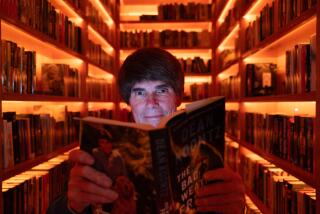The literati muse, mingle behind the scenes
Huddled on the patio with Tom Hayden, David Halberstam was going over the meaning of some of his earlier writings but thinking about how to cram in a nap and maybe some work before their upcoming session. Scott Turow was toggling thoughts of war with thoughts about his lack of singing talent. Ridley Pearson was hoping he’d remembered to button his fly.
While tens of thousands of readers swarmed over UCLA’s campus under a cloudless weekend sky for the Festival of Books, the authors themselves -- literary lions and cubs alike -- gathered in Royce Hall’s elegant private staging area known as the greenroom, doing what they do best: thinking. Some said their heads were full of poetry; others were ruminating on the logistics of getting dinner tickets or a baby sitter.
Diana Wagman, author of the novel “Bump,” was thinking about what she called “this greenroom situation,” a social atmosphere created by groaning buffet tables of fruit and sandwiches laid out in two small rooms and a patio of tables with umbrellas for dozens of writers, many of whom acknowledged living mostly in their heads.
While some buzzed with old friends and others chased young children, more than a few retreated alone to the corners or with spouses. “It’s antithetical to writers; we’re not usually talkers, we’re not usually social creatures,” Wagman said. The effort always leaves her exhausted, she said Saturday.
Many writers said they never turn off the observing and imagining even in the midst of something as social as the festival. George Pelecanos, a writer of working-class mysteries, said he had made mental notes on the shuttle bus driver and a black and white Riviera he had seen driving along Sunset Boulevard to the festival.
New York author Pete Hamill, thinking while smoking a Marlboro on the outside patio, said he had awakened at 6 a.m. wondering what time zone he was in. Then he made a to-do list for his next nonfiction book about New York. “When we were coming in, I was wondering if heaven has a greenroom. You sit in there and smoke until it’s your turn to be sent somewhere. If there’s a God, he’s got to look like Marcello Mastroianni, smoking Gauloises.”
A surprising number of writers were anxious. Some had no idea what they were going to talk about. “You have to react to what the questions are. You have no idea what that’s going to be like,” Hamill said. “It’s like placing yourself on yellow alert, as opposed to pale blue alert.”
Chris Abani, a Nigerian-born writer, had worked all night and was running on only three hours of sleep. “I just hope I don’t mess up on the panel,” he said.
Rushing outside with a quick cup of coffee, George Plimpton was clearly worried. “I have to run a panel on magical realism, so my mind is on all these books which are all in Spanish which I can’t read, and I have no information about the people who are on the panel,” he said, dashing off to find an escort.
Some writers said they were dreading the predictable, awkward questions from the audience. “When they ask, ‘What are your favorite books?’ I think, ‘How many friends can I abandon in the next five words I speak?’ ” said novelist Pearson.
Judging by the repeat announcements over the loudspeakers (“Will the poetry group please meet on the greenroom patio Paging Daniel Ells- berg”), it was obvious that following schedules was not among the writers’ priorities. As Ellsberg was paged for the third or fourth time, Hamill had another thought. “This is like the literary version of the Beverly Hills Hotel. You know, where guys will get themselves paged so people will go, ‘Oh, that’s .... ‘ “
An hour or so later, John Royden Maddox, a self-described “retired old gentleman” from London, sat off in a corner reading a newspaper. Maddox, a former editor of the journal Nature, had just attended the “Art of the Memoir” panel with the elusive Ellsberg and was thinking about how he had grown and changed as a public personality. “Ellsberg I’ve known for donkey’s years,” Maddox said. “It was interesting to see him. He’s obviously become a cult figure. The applause for every statement that was an antiwar statement was deafening. I thought it was very interesting that he’s transformed himself in that way because he was kind of a geek originally.”
Some writers said they enjoy reconnecting with friends they rarely see, meeting those they’ve only heard of, or basking in the adoration of fans because the mingling brings relief from all that isolation and thinking.
“The happiness of being in the greenroom is running into friends from all over the country who are writers,” said poet David St. John, who had just finished a panel on “The Personal and the Political,” and was holding a plate for his daughter Vivienne, 9. “Each year there’s a kind of excitement people feel that’s really latent here. It may just be what’s in the brownies, though.”
In the greenroom before her appearance on “Women Writing Science,” author and Times staff writer K.C. Cole said, “Every other minute of my life I think about war, my kids, my life, personal problems, what I’m going to wear, all the professional things. This is a break from that. This is where I just get to be celebrated.”
More to Read
Sign up for our Book Club newsletter
Get the latest news, events and more from the Los Angeles Times Book Club, and help us get L.A. reading and talking.
You may occasionally receive promotional content from the Los Angeles Times.






